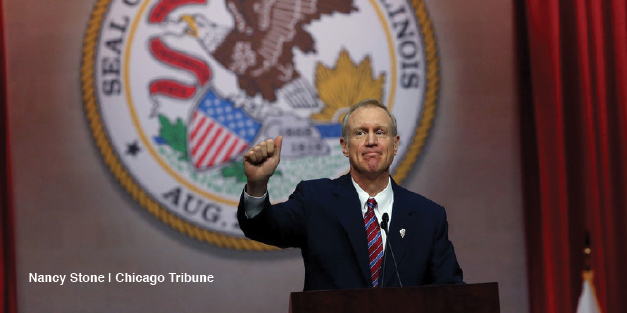Rauner, aides reject expansion of medical marijuana program
September 13, 2015
Gov. Bruce Rauner on Thursday continued his chilly reception of the medical marijuana program he inherited, vetoing a measure that would have allowed patients with post-traumatic stress disorder to qualify for medical marijuana as his administration revealed it would not expand the trial program to include 11 new ailments.
In his veto message, the Republican governor said the medical marijuana test program is still in its early stages and it would be premature to expand the scope “before we have had the chance to evaluate it.”
While the program launched in 2014 under then-Gov. Pat Quinn, a Democrat, numerous delays mean cultivation centers are just now growing crops and the first dispensary was licensed in August. Patients are not expected to have access to medical marijuana until late this year or early next year.
Advertisement
“No patients have yet been served, and, consequently, the state has not had the opportunity to evaluate the benefits and costs of the pilot program or determine areas for improvement or even whether to extend the program beyond its pilot period,” Rauner wrote to lawmakers.
Rauner’s veto comes after the Illinois Medical Cannabis Advisory Board had recommended that medical cannabis be used to treat 11 new medical conditions, including post-traumatic stress disorder, chronic post-surgical pain, osteoarthritis and irritable bowel syndrome. On Thursday, the Rauner-controlled Illinois Department of Public Health announced it would not be expanding the program to include the recommended conditions.
The U.S. Department of Veterans Affairs estimates that 11 to 20 percent of veterans who served in Iraq and Afghanistan, and 15 percent of Vietnam vets, suffer from PTSD.
Twelve other states and Washington, D.C., have authorized the use of medical marijuana for PTSD, according to the Marijuana Policy Project.
Anecdotal evidence suggests low-to-moderate doses of marijuana are useful for relieving the symptoms of PTSD, according to the advocacy group Veterans for Medical Cannabis Access. However, the VA has said controlled studies have not been conducted to evaluate the safety or effectiveness of medical marijuana for PTSD.
Last month, Rauner used his amendatory veto powers to change legislation that would have extended the medical marijuana test program by several years, cutting the time frame to an extra four months. The program is set to expire in January 2018, but advocates say they are negotiating with Rauner to reach an agreement about lengthening the program.
(c)2015 the Chicago Tribune
Advertisement*
Distributed by Tribune Content Agency, LLC.
Advertisement









